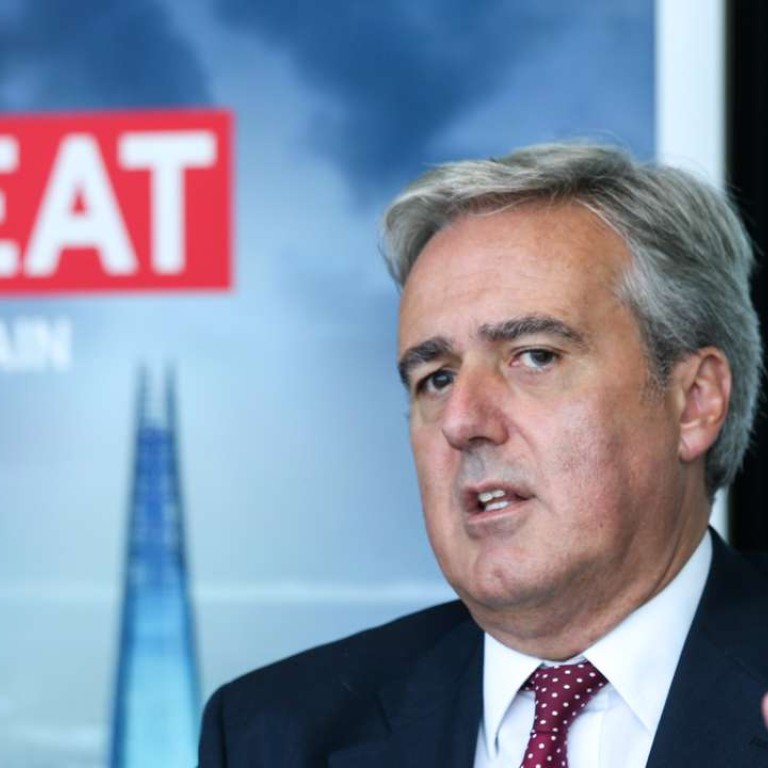
British international trade minister says crashing pound is “not unwelcome”
Speaking in Hong Kong, Mark Garnier’s comments come as French president François Hollande promises tough stance on Brexit
The pound’s dramatic slip to 31-year lows is “not unwelcome”, according to Britain’s new under secretary for international trade.
Mark Garnier said on Friday in Hong Kong the pound had “probably been too high anyway” against the euro and the US dollar, and was now correcting.
In the city as part of a Asian tour to promote investment in Britain, Garnier was reacting as the British currency weakened further in early Asian trade, after French president François Hollande called for a hard Brexit for Britain.
The pound has hit several fresh 31-year lows against the dollar this week.
“Clearly it’s to do with the [Brexit] vote, but actually it’s not an unwelcome reaction. Sterling is probably about where it should be,” said Garnier, parliamentary under secretary of state at the new Department for International Trade.
“We’re just going through a relatively short period of volatility.”
He said volatility was “a bad thing” and would be a factor in investors’ confidence in Britain.
But he noted part of the problem was that the British parliament wasn’t sitting at the moment which meant there was a deficit of news.
“We’ve probably found stability at this level. What we don’t want is to see it jumping around five per cent on a weekly basis – nobody wants their currency to be volatile.”
Clearly it’s to do with the [Brexit] vote, but actually it’s not an unwelcome reaction. Sterling is probably about where it should be
The currency fell to as low as 1.1819 against the US dollar on Friday morning, according to pricing provided by Thomson Reuters, before later recovering to $1.24. It was the most aggressive decline in the currency since news of the Brexit vote on June 25.
On Thursday, the currency hovered around $1.2720 after hitting a low of $1.2686 on Wednesday.
The aggressive fall on Friday takes its losses to 3.6 per cent since Monday, according to Reuters data.
Speaking in Paris at a dinner attended by EU officials, Hollande was quoted by the Financial Times as saying “we must go all the way through with the UK’s willingness to leave the EU. We have to have this firmness.
“If not, we would jeopardise the fundamental principles of the EU,” Hollande warned, suggesting the EU needs to make an example of Britain so that other nations considering leaving will know they can’t do it without a cost.

Hollande’s comments follow similar remarks by German Chancellor Angela Merkel, who said on Thursday that Britain would not receive any special treatment once it left the economic bloc.
The hefty pound selling began to accelerate following British Prime Minister Theresa May’s announcement on Sunday that Article 50, a piece of legislation that launches the exit process, could start by the first quarter of 2017.
Garnier was in Hong Kong for a day as part of a brief regional tour taking in Thailand and Japan, where he is working to reassure investors that Britain is worth investing in.
He’s the fifth senior British official to come to Hong Kong since the Brexit vote in June, after earlier visits Chancellor of the Exchequer Philip Hammond, and Lord Mayor of the City of London, Jeffrey Mountevans.
“It would be very easy to turn around and say: ‘this is the end of the world’. Actually it’s not, it’s the opposite, it’s a great opportunity for us to do more trade,” he added.
“It’s about going out and selling Britain, about making sure people understand what’s going on and understand that we are very much interested in doing business with everybody.”
When asked whether the push to sell Britain indicated the government was concerned, Garnier said: “You can interpret it whatever way you like. This isn’t being idealistically optimistic in order to pretend it’s not disastrous. Genuinely speaking when you have disruptive events, it provides great opportunities.”
The sense we get is that there is a great demand for the British brand. The demand in China is as yet an unmet demand
Around 11 per cent of British businesses that could be doing business overseas are doing business overseas, Garnier said, adding he sees China as a huge opportunity.
“The sense we get is that there is a great demand for the British brand. The demand in China is as yet an unmet demand.”
Garnier said the UK needed to do more work at home to persuade its local businesses that selling to China was “as easy as selling to the town next door”.
Until Britain begins the formal Brexit procedure by triggering article 50 in March, it can’t start hard negotiations, he said, but he’s hoping to negotiate a low-tarriff trade deal with China.
Many Chinese investors don’t think Britain’s economic growth will take a big dip due to the Brexit fallout, Louis Bai, China managing director with Britain’s biggest housebuilder Barratt Homes, told the Post.
“The plunging value of the pound post-Brexit has motivated many Chinese investors to go bottom fishing for British real estate,” Bai said, noting there had been a “dramatic surge” in the numbers of enquiries and property sales to Chinese investors from early July to late September.
“For the coming two years, we anticipate an army of China’s lower middle class to scramble to buy British properties on yuan depreciation and Chinese economic downturn expectations.”
Bai said the City of London, the central business district where multinational financial institutions are clustered, was the most sought-after place for Chinese home buyers.


